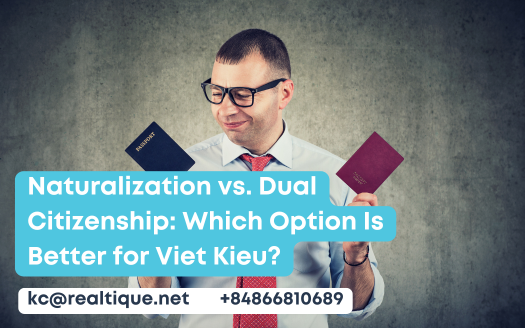Naturalization vs. Dual Citizenship: Which Option Is Better for Viet Kieu?
For Viet Kieu looking to strengthen their ties with Vietnam, choosing between naturalization and dual citizenship is an important decision. Both options have unique advantages and implications, impacting your legal rights, travel, property ownership, and cultural connection. This guide explores the key differences, benefits, and challenges of each, helping you decide which path aligns with your goals.
Table of Contents
What is Naturalization and How Does It Work in Vietnam?
Naturalization is the process of acquiring Vietnamese citizenship for those who do not already hold it. This option may involve renouncing your current nationality depending on Vietnam’s laws and your country of citizenship.
Requirements for Naturalization
- Proof of Vietnamese ancestry or long-term residency in Vietnam.
- Basic proficiency in the Vietnamese language.
- Clean criminal record and compliance with Vietnamese laws.
- Demonstrated integration into Vietnamese society and culture.
Steps to Apply for Naturalization
- Eligibility Assessment: Verify that you meet the legal requirements.
- Document Preparation: Gather proof of ancestry, identity, language proficiency, and residency.
- Application Submission: Submit all documents to the Department of Justice or Ministry of Justice.
- Interview and Decision: Attend an interview and await approval.
Key Advantages of Naturalization
- Full citizenship rights, including voting and unrestricted property ownership.
- Access to Vietnam’s healthcare and education systems.
- Eligibility for government programs and social benefits.
Potential Challenges
- If your current country does not allow dual citizenship, you may have to renounce your existing nationality.
- The process can be lengthy and requires thorough documentation.
What is Dual Citizenship and How Can Viet Kieu Benefit?
Dual citizenship allows Viet Kieu to retain their current nationality while acquiring Vietnamese citizenship, enjoying the benefits of both countries.
Eligibility for Dual Citizenship
- Proof of Vietnamese ancestry or marriage to a Vietnamese citizen.
- Residency or strong ties to Vietnam.
- Compliance with legal and tax obligations in both countries.
How Dual Citizenship Works in Vietnam
- Vietnam allows dual citizenship under the Nationality Law of 2008, particularly for Viet Kieu.
- Certain restrictions apply, such as limitations on military service and political participation in both countries.
Benefits of Dual Citizenship
- Freedom to live, work, and own property in Vietnam without relinquishing your current nationality.
- Simplified travel with two passports, reducing visa requirements.
- Access to healthcare, education, and other social benefits in Vietnam and your current country.
Challenges of Dual Citizenship
- Navigating tax obligations in two countries.
- Legal conflicts, particularly if one country does not recognize dual nationality.
Key Differences Between Naturalization and Dual Citizenship
While both paths lead to Vietnamese citizenship, there are significant differences in their implications and processes.
Naturalization
- Requires Renunciation? May require renouncing your current nationality, depending on your country’s laws.
- Residency Requirements: Often requires long-term residency in Vietnam.
- Cultural Integration: Focus on complete integration into Vietnamese society.
- Rights: Full rights as a Vietnamese citizen but with no ties to your former nationality if renounced.
Dual Citizenship
- Dual Nationality Allowed: Retain both nationalities.
- Residency Requirements: Less stringent for Viet Kieu.
- Flexibility: Maintain rights and benefits in both countries.
- Complexity: Requires managing legal and tax obligations in two countries.
Which is Better for Viet Kieu?
- Naturalization: Ideal for those seeking complete immersion in Vietnamese culture and society.
- Dual Citizenship: Perfect for those who want the best of both worlds—Vietnamese citizenship while keeping ties to their current country.
Factors to Consider When Choosing Between Naturalization and Dual Citizenship
Your decision depends on personal, legal, and financial factors. Here’s what to evaluate.
1. Legal Restrictions
- Check if your current country allows dual citizenship.
- Understand the legal implications of renouncing your current nationality if opting for naturalization.
2. Financial Implications
- Assess tax obligations in both countries.
- Consider property ownership advantages in Vietnam as a citizen.
3. Long-Term Goals
- Are you planning to live in Vietnam permanently or maintain a connection with another country?
- Think about your family’s needs, such as access to education and healthcare.
4. Cultural and Social Ties
- If deeply connected to Vietnam, naturalization may align with your goals.
- If maintaining connections in both countries is important, dual citizenship is preferable.
5. Travel and Mobility
- Dual citizenship offers greater flexibility for international travel.
- Naturalization provides full rights in Vietnam but may restrict mobility if your former nationality is renounced.
Steps to Apply for Naturalization or Dual Citizenship
Both options require careful planning and preparation. Here’s a step-by-step guide for each.
Steps for Naturalization
- Gather proof of ancestry or long-term residency.
- Prepare documents, including language proficiency and criminal clearance.
- Submit your application to the Department of Justice.
- Attend interviews and evaluations.
- Complete the oath of citizenship.
Steps for Dual Citizenship
- Verify eligibility under Vietnam’s Nationality Law.
- Compile proof of ancestry, identity, and residency.
- Submit your application and supporting documents.
- Maintain compliance with tax and legal obligations in both countries.
- Use both passports appropriately for travel and legal matters.
Pro Tips for Success
- Hire experts like Realtique to guide you through legal requirements and documentation.
- Begin the process early, as applications can take months to process.
- Stay informed about policy updates in both countries.
Choosing between naturalization and dual citizenship depends on your personal circumstances and goals. Naturalization offers full immersion in Vietnam’s culture and society, while dual citizenship allows you to maintain strong ties with both Vietnam and your current country. Evaluate your priorities, legal requirements, and long-term plans to make the right decision.
For expert guidance on navigating Vietnamese citizenship options, contact Realtique today. Our team specializes in helping Viet Kieu achieve their goals through informed decision-making and seamless application processes. Let us help you reconnect with Vietnam!





